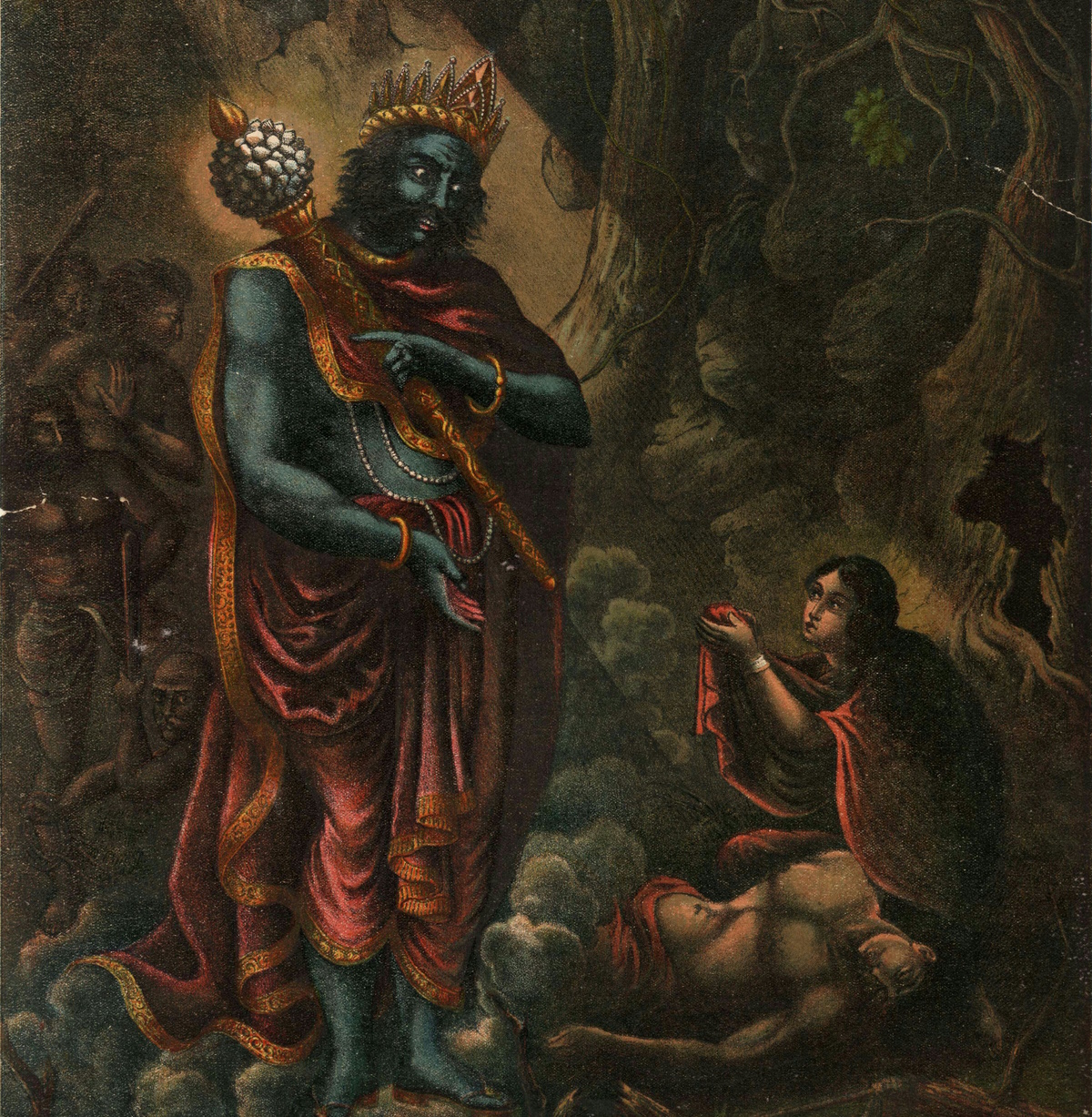Oldest human record not broken for 28 years – are we making any progress with maximum lifespan?
Will Jeanne Calment’s record 122 years ever be broken?
Join the club for FREE to access the whole archive and other member benefits.
In Hindu mythology, there is a story that tells of true love and how it restored health, wealth, and even defeated death. This story is about an exiled prince, Satyavan, and his princess bride Savitri, a young couple who were doomed to be separated after just a year of marriage as Satyavan was cursed to die.
However, Savitri, being an enterprising young woman, refused to accept this fate.
On the day that Satyavan was to perish, she accompanied him into the woods where he worked as a woodcutter. In the middle of the day, Satyavan suddenly became weak and laid down with his head on Savitri’s lap. As she watched her husband slip into a deep sleep, Savitri saw the god of death, Yama, taking Satyavan’s soul. Brave Savitri followed Yama all the way to the underworld arguing with him about Satyavan’s death. Such was the power and ingenuity of her arguments, that Yama granted her three wishes—she could wish for anything except the life of her husband. With her first wish, Savitri asked for Satyavan’s ailing father to regain full health and for his kingdom to be restored to him. For her second, Savitri wished to be the ideal wife to Satyavan. And then, as a third wish, she asked Yama to make her a mother to a hundred sons.
Now, Yama was stuck—he could not grant her the third wish without breaking the terms of the second wish unless he restored her husband to life. Impressed by Savitri’s wit and perseverance, Yama restored Satyavan to life and the blessed the young couple with a long happy life.

And so, in this story, romantic love staved off death. But what do real-life examples show?
In real life, things are not so simple—one does not trick death through debate. However, ageing and death can be staved off or hastened by a variety of factors, among which, romantic love is one.
Scientific evidence shows that ‘love’ (which translates, in animals, to mating and reproduction) in many species actually shortens life spans and leads to an early death.
For example, in fruit flies, females that mate early and mate with multiple males die earlier—a phenomenon often referred to as a live fast, die young life history strategy. This happens not only because mating is physically demanding, energetically expensive, and leaves less time for feeding, but also because the seminal fluid that the males pump into the females contains toxins that literally poison her to death. Added to this are the stresses of egg-laying and physical injuries either during mating (male flies are rough lovers) or incidental damage if they are caught up in fights between males (male flies brawling over females are akin to human bar fights). Love, for female fruit flies, seems to wear them to death.
But this pattern is not only restricted to females—males also bear the brunt of their romantic exploits. In some animals where males need to attract females to mate with, the males put their very lives at risk when they display their suitability as mates. This is very apparent in many species of birds in which the male is brightly coloured to attract females; unfortunately, this means that the males are also highly visible to and attractive to hunters. In insects such as cicadas and crickets, and animals such as frogs, the males show off their masculinity by serenading females with loud, long, and/or complicated songs; here again, the male singers are hunted by bats and owls that eavesdrop on the romantic ballads and use them as dinner gongs. In other species, such as moose, mountain goats, and some fish, males fight other males almost to death in violent displays of machismo, just for the chance to mate. For these males, love is a dangerous gamble.

But just when you begin to think that perhaps romantic love is not conducive to a long productive life, nature throws you a googly in the form of ants, bees, and termites. Queen bees who do not mate, usually live very short lives—less than a year or so. Alternatively, a queen who mates with 12–15 males within ten days of her birth, lives a full, highly procreative life of up to two decades. Likewise, mated termite queens can live for up to 25 years while mated termite males, called ‘kings’, can live between 1–4 years, and sterile termite workers typically live for less than a year. Recent work has also shown that in some species of fruit flies, wild-caught males and females that have been mated, tend to live longer than virgins.
The plain truth is that in many animals, although love and romance can affect ageing and life spans, these effects are hugely dependent on genetics, the environment, and nutrition.
In humans, as can be expected, the link between romance, ageing, and death are even more complicated. Unlike many animals, where romance lasts only during a set mating season and is more of a biological drive, romance in humans involves the formation of strong mental, emotional, and physical connections that leave lasting impressions on health.
Several studies have shown that being married lowers the risk of premature death during middle age. Middle-aged people who did not have stable life partners were found to be twice as likely to die early than those who had life partners. Others have documented that single or divorced people, especially men, are at higher risk of developing dementia and dying of cancer and heart disease at earlier ages than married men. Conversely, one study showed that the ‘risk’ of becoming a centenarian after reaching 75 years was lower for married people. In other words, being divorced or single after 75 years of age actually increased a person’s chances of living past a century.
What these paradoxical patterns ultimately highlight, is that the associations between marriage and health, ageing, and death are anything but simplistic. The supposedly multiple positive associations between marriage, health, and long life are riddled with many caveats.
For example, studies on dementia note that it is not just marriage that staves off dementia, but rather, the presence of deep meaningful relationships. Such relationships may not necessarily be with a spouse, but being married usually means having a family, which increases the chances that there are other people with whom such meaningful, deep relationships can arise and blossom. Similarly, several researchers have argued that marriage may not be the cause of better health, but that the relationship arises because of a selection bias. If healthier people are more likely to get married and stay married, then marriage is not the cause of better health, but rather, better health is the cause of longer marriages! To make matters even more confusing (and interesting), both these situations have been found to be true in humans. It turns out that the association between marriage and health in younger people is driven by selection for a healthy partner, whereas, in older couples, marriage seemed to have a protective effect on health. Married men and women seem to spend more on preventive health check-ups and engage in healthier behaviour such as maintaining healthy eating habits and sleep cycles or quitting unhealthy habits like smoking. Correspondingly, in married patients, cancer is detected at earlier stages and their recovery from surgeries and chemotherapy is better than in patients who are either single or divorced.

In addition, marriage can affect the health and life spans of people depending on lifestyle differences. A study in Denmark highlighted this by showing that money and education were important factors that affected the benefits of marriage on health. People with low incomes and less education lived longer if they were married rather than if they were in live-in relationships. But for those who were well-educated and had high incomes, cohabiting couples lived longer than married ones.
However, the intricacies that underlie the effects of marriage on health and life span do not end there, as more nuanced studies have uncovered. Marriage can affect the health and life spans of men and women differently. The most common pattern observed so far is that marriage has a far stronger effect on men’s health and ageing rather than on women’s. For instance, unmarried and divorced men are, in general, more likely to suffer from and die due to strokes, cardiovascular diseases, or cancer, than unmarried or divorced women and married people.
Another major factor that affects how marriage influences men and women’s health and life span is the difference in the age between the spouses. Studies have demonstrated that men with younger wives live longer; except in the cases of very wealthy old men, who were more likely to die if they had young wives (which is perhaps not surprising). The most common explanations for this trend suggest that younger women are better caregivers for older spouses than older women, and that having a ‘young wife’ provides men with positive psychological and sociological feedback.
But for women, a younger spouse does not translate to a longer life. Older women with younger husbands seemed to die at younger ages than men with younger wives. What is interesting about the causes of these women’s deaths is that they are far more likely than most other people to die of accidents that are not suicides. The reasons for this trend, it is believed, may lie in a mix of behaviours and inclinations that lead women with younger husbands to seek out riskier activities with high accident rates. Overall, these studies have suggested that having a younger spouse is beneficial if you are a man, but detrimental if you are a woman, and that having an older spouse is detrimental to both men and women.
So, given all these facts, should humans stay single or get married to live longer?
There is, obviously, no clear answer to this.
While many scientific studies suggest that marriage may extend life spans, Emma Morano, a 117-year-old sworn singleton, maintained till her death in 2017, that an independent unattached life helped her survive for so long. Some research does support Morano’s declaration in that when people value independence, they live happier and healthier lives if their romantic relationships do not limit their freedom. In married couples, the opposite holds true—a strong need for self-sufficiency strangles well-being.
In the end, one should strive to have the healthiest, happiest, most fulfilling life that can be imagined—single or married—it doesn’t really matter.
Blog written by Anusha Krishnan
1) Hoffman, J.M., Dudeck, S.K., Patterson, H.K. and Austad, S.N., 2021. Sex, mating and repeatability of Drosophila melanogaster longevity. Royal Society open science, 8(8), p.210273. https://royalsocietypublishing.org/doi/pdf/10.1098/rsos.210273
2) https://www.inverse.com/article/50615-why-is-my-bro-threatening-me. First accessed on 10th February 2023.
3) Koliada, A., Gavrilyuk, K., Burdylyuk, N., Strilbytska, O., Storey, K.B., Kuharskii, V., Lushchak, O. and Vaiserman, A., 2020. Mating status affects Drosophila lifespan, metabolism and antioxidant system. Comparative Biochemistry and Physiology Part A: Molecular & Integrative Physiology, 246, p.110716. https://www.sciencedirect.com/science/article/pii/S1095643320300684
4) Travers, L.M., Garcia-Gonzalez, F. and Simmons, L.W., 2015. Live fast die young life history in females: evolutionary trade-off between early life mating and lifespan in female Drosophila melanogaster. Scientific Reports, 5(1), p.15469. https://www.nature.com/articles/srep15469
5) Heinze, J. and Giehr, J., 2021. The plasticity of lifespan in social insects. Philosophical Transactions of the Royal Society B, 376(1823), p.20190734. https://royalsocietypublishing.org/doi/full/10.1098/rstb.2019.0734
6) https://www.huffpost.com/entry/marriage-research_n_2450639. First accessed on 7th February 2023.
7) Ben-Shlomo, Y., Smith, G.D., Shipley, M. and Marmot, M.G., 1993. Magnitude and causes of mortality differences between married and unmarried men. Journal of Epidemiology & Community Health, 47(3), pp.200-205. https://jech.bmj.com/content/jech/47/3/200.full.pdf
8) Sundström, A., Westerlund, O. and Kotyrlo, E., 2016. Marital status and risk of dementia: a nationwide population-based prospective study from Sweden. BMJ open, 6(1), p.e008565. https://bmjopen.bmj.com/content/bmjopen/6/1/e008565.full.pdf
9) https://www.bbc.com/news/health-41780686. First accessed on 7th February 2023.
10) Guner, N., Kulikova, Y. and Llull, J., 2014. Does marriage make you healthier? https://www.econstor.eu/bitstream/10419/106571/1/dp8633.pdf
11) Bhardwaj, R., Amiri, S., Buchwald, D. and Amram, O., 2020. Environmental correlates of reaching a centenarian age: Analysis of 144,665 deaths in Washington state for 2011− 2015. International journal of environmental research and public health, 17(8), p.2828. https://www.mdpi.com/1660-4601/17/8/2828
12) Aizer, A.A., Chen, M.H., McCarthy, E.P., Mendu, M.L., Koo, S., Wilhite, T.J., Graham, P.L., Choueiri, T.K., Hoffman, K.E., Martin, N.E. and Hu, J.C., 2013. Marital status and survival in patients with cancer. Journal of clinical oncology, 31(31), p.3869. https://www.ncbi.nlm.nih.gov/pmc/articles/PMC4878087/
13) Wang, Y., Jiao, Y., Nie, J., O’Neil, A., Huang, W., Zhang, L., Han, J., Liu, H., Zhu, Y., Yu, C. and Woodward, M., 2020. Sex differences in the association between marital status and the risk of cardiovascular, cancer, and all-cause mortality: a systematic review and meta-analysis of 7,881,040 individuals. Global health research and policy, 5(1), pp.1-16. https://ghrp.biomedcentral.com/articles/10.1186/s41256-020-00133-8
14) Drefahl, S., 2010. How does the age gap between partners affect their survival?. Demography, 47(2), pp.313-326. https://www.ncbi.nlm.nih.gov/pmc/articles/PMC3000022/
15) https://www.theguardian.com/lifeandstyle/2016/mar/31/women-marrying-younger-men-dying-earlier-research. First accessed on 7th February 2023.
Spermidine - the little known, but big hitting anti-ageing supplement
Antioxidants in ageing and health
Will Jeanne Calment’s record 122 years ever be broken?
Has this century seen extraordinarily long-lived Wimbledon champions, or are winners over 30 years of age the new normal?
Not as long as you might think. For radical life extension we need to reverse ageing.
The data and science behind the exponential growth in mortality with age
Relief for the many people who think their coffee habit is a guilty pleasure